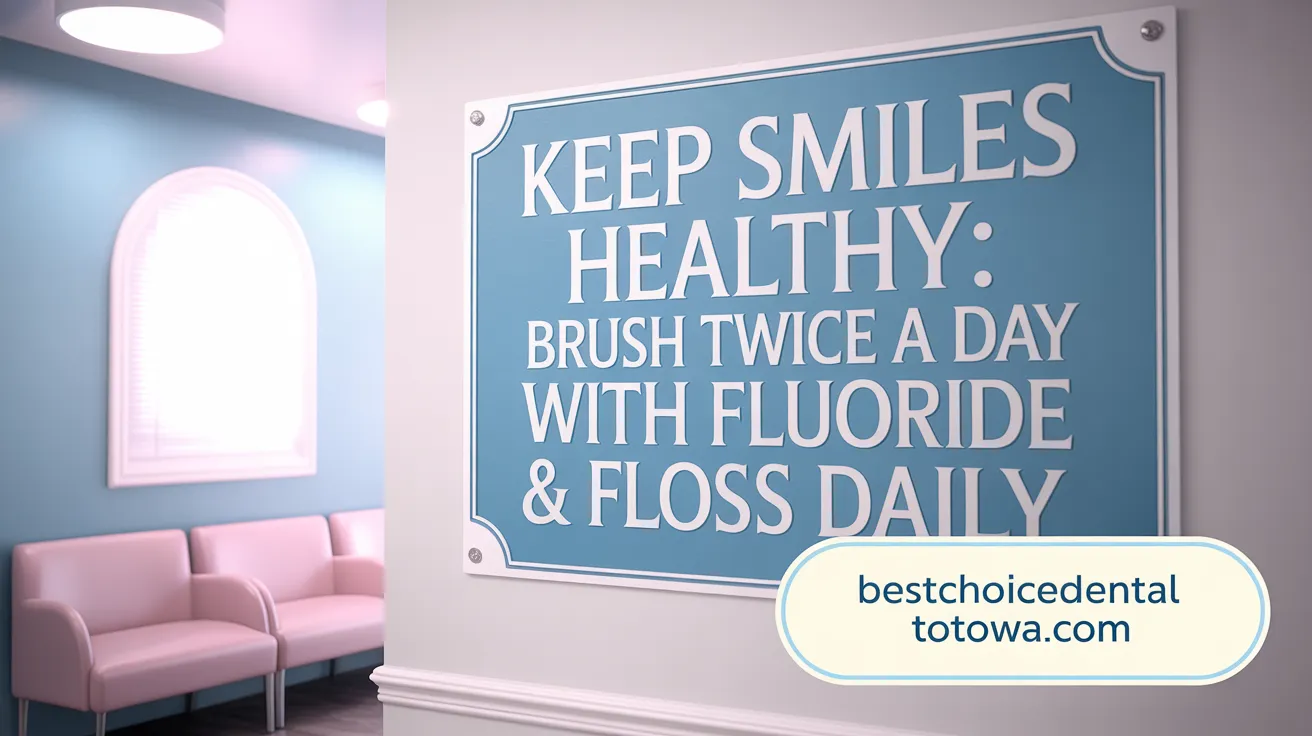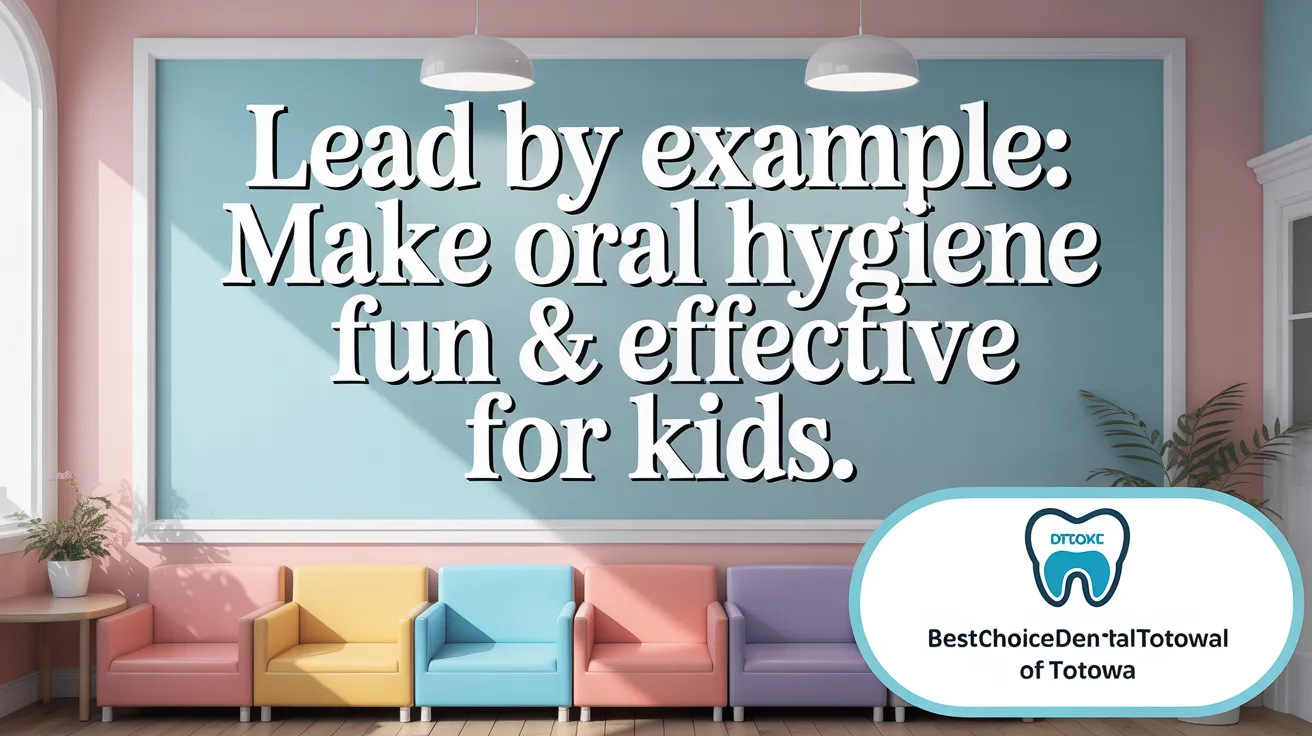The Foundation of Lifelong Oral Health Starts at Home
Importance of Early Oral Hygiene Habits
Starting good oral care early, even before the first tooth appears, is vital for lifelong oral health. Parents are encouraged to gently clean their baby’s gums and begin brushing as soon as teeth emerge with fluoride toothpaste. Early dental visits, ideally by the child's first birthday, help prevent cavities and allow dentists to monitor development.
Role of Family Routines in Oral Health
Family routines play a crucial role in maintaining oral health. Brushing teeth together, flossing daily, and using proper techniques such as gentle circular brushing at a 45-degree angle promote effective plaque removal. Modeling these habits encourages children to adopt and maintain them. Regular dental checkups and cleanings every six months support ongoing oral health for all family members. Healthy diet choices and avoiding tobacco further support this foundation.
Family Oral Hygiene and Dental Care Key Facts
- Consistent brushing twice daily with fluoride toothpaste strengthens tooth enamel and removes plaque.
- Proper brushing involves holding the toothbrush at a 45-degree angle and using small, circular motions for two minutes.
- Daily flossing removes plaque and food particles between teeth, preventing cavities and gum disease.
- Early dental visits (by age one) help familiarize children with dental care and reduce anxiety.
- Routine dental check-ups are recommended every six months, with more frequent visits for children and those with dental issues.
- Professional cleanings and preventive treatments like fluoride and sealants strengthen enamel and prevent cavities.
- Limiting sugary and acidic foods/drinks reduces the risk of tooth decay and enamel erosion.
- Incorporating calcium-rich foods and crunchy fruits and vegetables strengthens teeth and stimulates gums.
- Parents should model good oral habits, make brushing fun, and start oral hygiene early to instill lifelong habits.
- Avoiding tobacco and secondhand smoke is essential to prevent gum disease, oral cancer, and stained teeth.
1. Consistent Brushing and Flossing Rituals for Every Family Member

Why is brushing teeth twice daily with fluoride toothpaste important?
Consistent brushing at least twice a day with fluoride toothpaste is fundamental for all family members to maintain healthy teeth and gums. Fluoride strengthens tooth enamel, making it more resistant to decay. Brushing removes plaque, a sticky film of bacteria that can cause cavities and gum disease, especially when done properly.
What are proper brushing techniques everyone should follow?
Using the correct brushing technique maximizes plaque removal and protects gums. The toothbrush should be held at a 45-degree angle to the gumline. Gently brush using small, circular motions to clean all surfaces of each tooth, including front, back, and chewing surfaces. Brushing for about two minutes prevents damage from aggressive brushing and ensures thorough cleansing. Using a soft-bristled toothbrush with the ADA Seal of Acceptance enhances effectiveness and comfort.
Why is daily flossing crucial?
Flossing daily cleans the spaces between teeth where toothbrush bristles cannot reach. It removes plaque and trapped food particles, preventing gingivitis and tartar buildup. Without flossing, these areas can harbor bacteria that lead to cavities and gum disease. Adults and children alike benefit from regular flossing to maintain oral health.
How can parents support children's brushing habits?
Parents play a significant role in supervising children’s brushing to ensure effective cleaning. Until children develop good motor skills, parental assistance is essential. Demonstrating proper brushing, making the experience fun, and brushing together as a family can motivate children to adopt lifelong habits. Starting dental care early, even before the first tooth emerges, helps build a strong foundation for good oral hygiene.
What dental products are recommended for family oral care?
Selecting the right dental products enhances oral hygiene routines. Use fluoride toothpaste tailored for age, soft-bristled toothbrushes that fit comfortably in the mouth, and floss or interdental brushes suited to the individual's needs. Mouthwashes—preferably alcohol-free and with antibacterial properties—can complement brushing and flossing, helping reduce bacterial buildup and freshen breath.
Together, consistent brushing and flossing, supported by proper technique and guided by parents, build essential oral health habits that benefit the entire family throughout life.
2. Regular Dental Visits as a Family Priority

Starting Dental Visits Early in Childhood
Introducing children to the dentist by their first birthday or when their first tooth appears is vital. Early visits familiarize kids with the dental environment, reduce anxiety, and enable dentists to monitor growth and development effectively. Establishing a positive dental experience early lays the groundwork for lifelong oral health.
Frequency of Dental Check-ups for Different Ages
Routine dental check-ups generally occur every six months for most family members. For children, visits may be more frequent—ranging from three to twelve months—depending on individual needs such as cavity risk or developmental stages. Adults typically follow the six-month schedule, but those with specific dental health issues may require more frequent visits. Seniors benefit from routine check-ups and screenings to manage age-related oral health changes (regular dental check-ups).
Professional Cleanings and Preventive Treatments
Professional dental cleanings during routine visits remove tartar and plaque buildup that home care cannot eliminate. Preventive treatments such as fluoride applications and Dental sealants are essential, especially for children, to strengthen enamel and protect against cavities. These visits also provide an opportunity for dentists to offer personalized advice on brushing, flossing, and nutrition to support oral health at every life stage.
Reducing Dental Anxiety in Children
Creating a welcoming and friendly dental environment helps ease children's fears. Familiarity gained through early and regular visits reduces dental anxiety over time. Family dentists often use patient-focused techniques, education, and gentle care to build trust with young patients, making dental visits positive experiences.
Benefits of Family Dentist Relationships
Maintaining relationships with a family dentist provides personalized, continuous care tailored to each family member's needs. Long-term dental care fosters trust, encourages regular attendance, and allows the dentist to detect and address potential issues early. This comprehensive approach enhances preventive care, ensuring that every generation enjoys optimal oral health.
3. Nourishing Teeth with Healthy Family Diet Choices

Limiting Sugary and Acidic Foods and Drinks
Reducing the intake of sugary foods and drinks and beverages is essential for protecting your family’s teeth. Sugar feeds harmful bacteria that produce acids, leading to tooth decay and enamel erosion. Avoid constant snacking on sticky sweets and sugary sodas to reduce cavity risk.
Benefits of Calcium-Rich and Crunchy Foods
Including calcium-rich foods like cheese, yogurt, and milk helps strengthen tooth enamel. Crunchy fruits and vegetables such as apples, carrots, and celery naturally clean teeth surfaces and stimulate gums, promoting healthier teeth and gums (Healthy diet for better oral health).
Hydration and Saliva Stimulation
Drinking plenty of water throughout the day helps rinse away food particles and bacteria (Benefits of Drinking Water for Teeth). Staying hydrated also encourages saliva production, which neutralizes acids and repairs tooth enamel (Saliva Production and Cavity Reduction. Chewing sugar-free gum can additionally stimulate saliva for enhanced protection.
Impact of Diet on Cavity Prevention
A balanced diet supported by good oral hygiene is vital for cavity prevention. Combining low-sugar eating habits with fluoride toothpaste use strengthens teeth and reduces decay. Limiting sugary snacks especially before bedtime minimizes acid attacks when saliva flow decreases (Oral health tips for children).
Family Meal Practices Supporting Oral Health
Encourage family meals with nutrient-rich foods and limit sugary treats. Modeling healthy eating and oral care habits helps children adopt lifelong good practices. Avoid using bottles or sippy cups filled with sugary liquids, particularly at bedtime, to protect developing teeth from decay (Healthy eating for kids and oral health).
4. Modeling and Teaching Proper Oral Hygiene Habits Early

When Should Oral Hygiene Begin for Children?
Establishing early dental care routine is essential for promoting lifelong dental health. Gently wiping a baby's gums twice daily with a soft cloth helps remove bacteria and prepares the child for future brushing routines. Early introduction to oral care creates a positive association that supports ongoing dental health.
How Can Parents Act as Role Models?
Parents play a vital role in teaching good oral hygiene tips by practicing consistent dental care themselves. Brushing and flossing together with children demonstrates proper techniques and communicates the importance of oral health. Family brushing routines reinforce habits and create a supportive environment.
How to Make Brushing Fun for Children?
Making toothbrushing an engaging activity promotes children's willingness to participate. Using playful toothbrushes, songs, or games can turn brushing into a positive experience. Creative approaches help maintain children's interest and encourage thorough cleaning.
When and How Should Flossing Be Introduced?
When to start flossing should begin as soon as children's teeth start to touch, generally around age two. Using child-friendly flossers or floss picks simplifies the process and makes it more engaging. Teaching children the correct technique, such as guiding the floss in a C shape around each tooth, ensures effective plaque removal between teeth.
What Role Does Positive Reinforcement Play?
Consistent encouragement and praise motivate children to maintain oral hygiene routines. Establishing a regular consistent oral care routines helps build habits, while rewards and verbal reinforcement support long-term compliance. A positive routine fosters confidence and reduces dental anxiety.
5. Avoiding Harmful Habits to Protect Family Oral Health
Why is avoiding tobacco and secondhand smoke important for oral health?
Avoiding tobacco use and exposure to secondhand smoke is crucial for protecting your family's oral health. Tobacco products increase the risk of gum disease, oral cancer, bad breath, and stained teeth. Secondhand smoke also negatively impacts children's dental health, increasing their risk for cavities and gum problems. For more detailed information, see Oral health tips for adults and Oral health and overall health.
How can limiting sugary drinks, especially in bottles or sippy cups, protect children's teeth?
Limiting sugary drinks in bottles or sippy cups—particularly avoiding their use during bedtime or throughout the day—is vital to prevent tooth decay in children. Frequent exposure to sugar promotes cavity formation, especially in primary teeth. Offering water instead supports healthy teeth and oral development. Refer to Oral health tips for children and Early dental care tips for parents for more guidance.
What strategies help manage dry mouth in elders and vulnerable family members?
Dry mouth is a common issue among seniors and vulnerable individuals, which can lead to discomfort, increased cavities, and gum disease. Managing dry mouth includes encouraging hydration by drinking water regularly and using saliva substitutes recommended by dentists. Avoiding alcohol and tobacco can also help maintain natural saliva flow. Learn more about Managing Dry Mouth in Seniors and Lifelong oral care habits.
How does promoting hydration and saliva substitutes benefit oral health?
Staying well hydrated helps flush away food particles and bacteria, stimulating saliva production which naturally protects teeth and gums. Using saliva substitutes provides moisture that can prevent oral infections and make oral hygiene routines more comfortable when natural saliva is insufficient. Additional info is available in Back-to-School Dental Tips and Oral hygiene tips.
How can oral health challenges unique to different family ages be addressed?
Different ages bring distinct dental challenges. For children, establishing good hygiene early, limiting sugary snacks, and regular dental visits prevent decay. Teenagers benefit from continued hygiene education and awareness of gum disease. Adults should focus on preventing enamel wear and managing dietary impacts. Seniors need gentle care, attention to dry mouth, and close monitoring for gum disease and oral cancer. Tailored oral care at each life stage supports the entire family’s lifelong dental health. Explore Tips for healthy oral habits in children, The lifelong value of good oral care habits, and Family Dentistry for Lifelong Oral Health for comprehensive strategies.
Lifelong Oral Health Is a Family Affair
Family Dental Care Habits
Good oral health starts at home and benefits from consistent family habits. Brushing twice daily with fluoride toothpaste, flossing regularly, and scheduling routine dental visits help prevent cavities and gum disease.
Encouragement and Support
Adopting and maintaining these habits at any age supports a healthy smile and overall well-being. Encouraging children early through fun brushing routines and positive reinforcement lays the foundation for lifelong oral health.
Supportive Family Environment
A family environment where everyone models good oral care, eats a balanced diet, and avoids tobacco creates a positive setting. Regular dental checkups and open communication with your dentist ensure tailored care for each family member’s needs, promoting lasting oral health for all.
